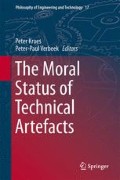Abstract
The discussion about moral agency and technology is troubled by some severe misunderstandings. Too often, the claim that technologies are involved in moral agency is misread for the claim that technologies are moral agents themselves. Much of the discussion then focuses on the question whether not only humans but also technologies can have intentionality, freedom, responsibility, and, ultimately, moral agency. From the perspective of mediation theory, this discussion remains caught in a dualist paradigm that locates human beings and technological artifacts in two separate realms, humans being intentional and free, technologies being instrumental and mute. Against the question to what extent technologies can be moral agents, mediation theory makes it possible to investigate how intentionality, freedom, and agency are in fact the result of intricate connections and interactions between human beings and technological artifacts. Rather than checking if technologies can meet a pre-given criterion of moral agency, we need to re-conceptualize the phenomenon of moral agency itself in order to understand the roles of technologies in our daily lives.
Access this chapter
Tax calculation will be finalised at checkout
Purchases are for personal use only
Notes
- 1.
This contribution incorporates and substantially expands elements of the brief ‘reply to critics’ I gave in the journal Philosophy and Technology, in a symposium on my book Moralizing Technology (Verbeek 2012).
- 2.
I am well aware that a proper definition of moral agency requires other elements as well, including the capacity of moral reasoning, as Illies and Meijers argue in their contribution to this volume. But for this capacity the same type of arguments can be developed that I will develop for intentionality and freedom, i.e. that they should be seen as the result of a complex interplay between human and nonhuman entities, rather than a property that both humans and nonhumans can possess.
References
Berlin, I. (1979). Two concepts of liberty. In Four essays on liberty (pp. 118–172). Oxford: Oxford University Press.
Foucault, M. (1997). What is enlightenment? In P. Rabinow (Ed.), M. Foucault, ethics: Subjectivity and truth. New York: New Press.
Freud, S. (1955). A difficulty in the path of psycho-analysis. In J. Strachey (Ed. & Trans.), The standard edition of the complete psychological works of Sigmund Freud (Vol. 17). London: Hogarth Press.
Ihde, D. (1990). Technology and the lifeworld. Bloomington: Indiana University Press.
Knight, W. (2005, February 5). Mirror that reflects your future self. New Scientist, (2485), 23.
Latour, B. (1993). We have never been modern (C. Porter, Trans.). Cambridge: Harvard University Press. (Translation of: Nous n’avons jamais été modernes, Paris: La Découverte, 1991).
Leentjens, et al. (2004). Manipuleerbare wilsbekwaamheid: Een ethisch probleem bij elektrostimulatie van de nucleus subthalamicus voor ernstige ziekte van Parkinson. Nederlands Tijdschrift voor Geneeskunde, 148, 1394–1398.
Peterson, M. (2012). Three objections to Verbeek. In E. Selinger et al. (Ed.), Book symposium on Peter Paul Verbeek’s moralizing technology: Understanding and designing the morality of things, philosophy and technology (Vol. 25, pp. 619–625).
Verbeek, P. P. (2005). What things do: Philosophical reflections on technology, agency, and design. University Park: Penn State University Press.
Verbeek, P. P. (2011). Moralizing technology: Understanding and designing the morality of things. Chicago/London: University of Chicago Press.
Verbeek, P. P. (2012). The irony of humanism: On the complexities of discussing the moral significance of things. In E. Selinger et al. (Ed.), Book symposium on Peter Paul Verbeek’s moralizing technology: Understanding and designing the morality of things, philosophy and technology (Vol. 25, pp. 626–631).
Author information
Authors and Affiliations
Corresponding author
Editor information
Editors and Affiliations
Rights and permissions
Copyright information
© 2014 Springer Science+Business Media Dordrecht
About this chapter
Cite this chapter
Verbeek, PP. (2014). Some Misunderstandings About the Moral Significance of Technology. In: Kroes, P., Verbeek, PP. (eds) The Moral Status of Technical Artefacts. Philosophy of Engineering and Technology, vol 17. Springer, Dordrecht. https://doi.org/10.1007/978-94-007-7914-3_5
Download citation
DOI: https://doi.org/10.1007/978-94-007-7914-3_5
Published:
Publisher Name: Springer, Dordrecht
Print ISBN: 978-94-007-7913-6
Online ISBN: 978-94-007-7914-3
eBook Packages: Humanities, Social Sciences and LawPhilosophy and Religion (R0)

